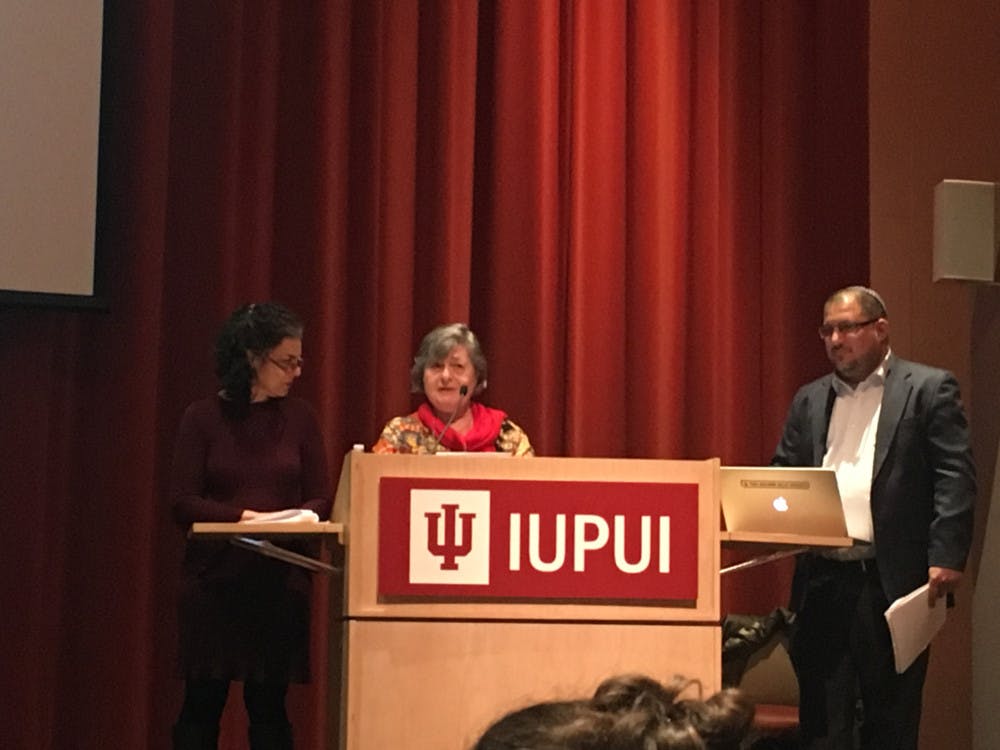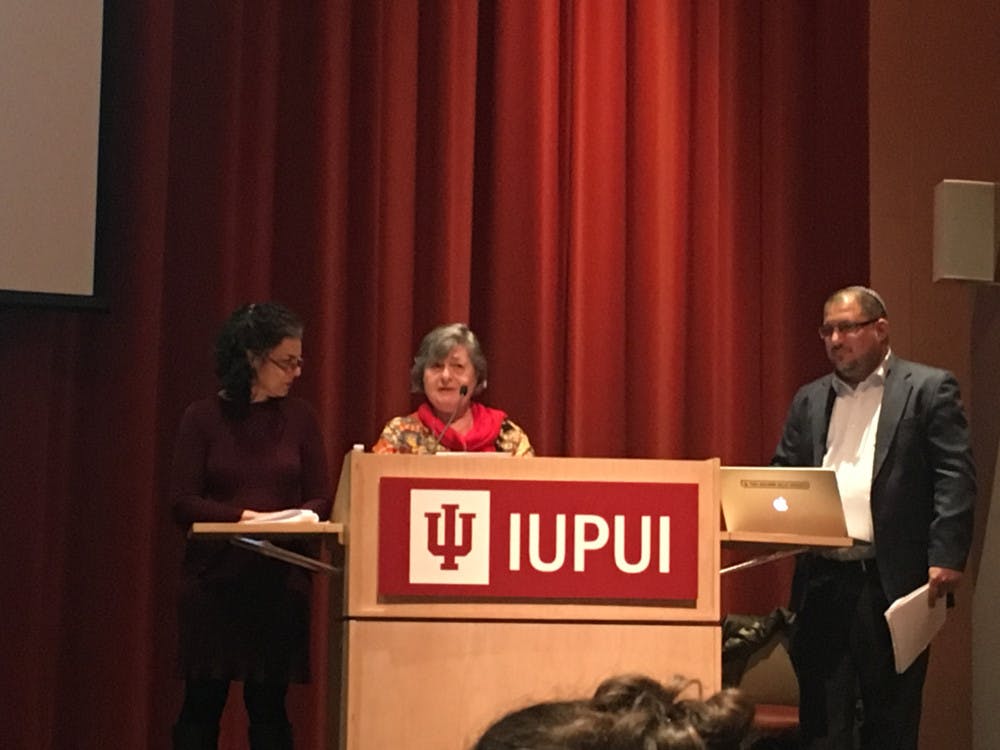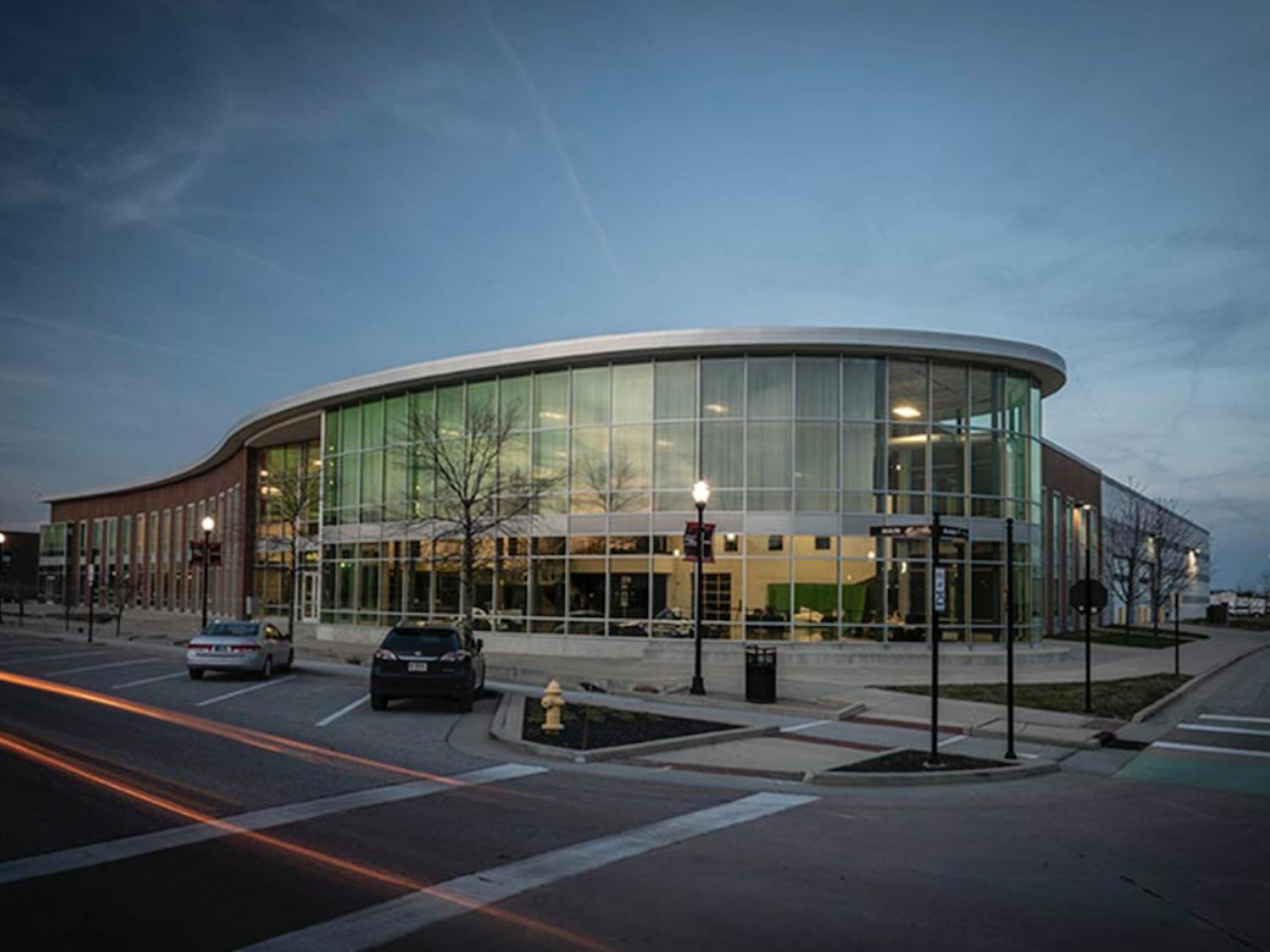“Give me your tired, your poor, your huddled masses yearning to be free.”
These words, written by American poet Emily Lazarus and inscribed at the base of the Statue of Liberty, served as a backdrop for IUPUI’s Holocaust Remembrance Ceremony held on Jan. 28 in Hine Hall auditorium.
For keynote speaker and Holocaust survivor, Esther Davidson, these words serve as a reminder of what it means to be an American. As part of the Jewish Federation of Greater Indianapolis, Davidson shares her family’s story of survival.
Davidson was born in Poland in 1941 to Jewish parents. Her mother, Chava, left Esther in the care of Reba, an elderly Christian to protect the young girl from being captured. Chava changed her name to Nellie in an attempt to sound less Jewish and passed as a Christian to evade the Nazis throughout the course of the war.
In Reba’s care, Davidson went to church every Sunday and wore a crucifix around her neck everyday, unaware of her biological family and identity. At the conclusion of the war, Davidson’s parents came back for her. With Davidson terrified of the two strangers, Reba eventually explained to Davidson that these strangers were her parents, that they loved her, and they wanted to take her home with them.
“This, to me, was just a continuation of life,” Davidson said of her reunion with her parents. “You just keep going. It had more of an impact on my parents, who couldn’t wait to get the cross of my neck. My mother took hers off and took mine off, and I do have a Star of David. I wear that almost always...for me it was just life as normal.”

After their reunion, Davidson and her parents lived in a Red Cross-run Displaced Persons camp in Germany. Davidson, who spoke Polish and Russian, learned Yiddish from her family and was slowly acclimated into their lifestyle.
In her description of the Displaced Persons camp, Davidson describes a tight-knit community that offered survivors a chance to heal and re-establish an identity they had been stripped of by the Nazis.
“There were lots of children in the camp. They set up schools and you had people to play with and you were being taught to read and write,” Davidson said. “There were other adults who could commiserate with one another. No one had more or less than anyone else.”
A memory that sticks out to Davidson was her first car ride--taken in a Jeep that a GI drove into the camp.
“Stupid stuff is what you remember,” Davidson said. “But that’s a child’s memory.”
But not all the memories are pleasant.
“I remember being hungry,” Davidson said. “I remember being bathed once a week, or maybe once every two weeks. Soap was a luxury,” Davidson explained. “I remember those things, but it didn’t change my life. It didn’t matter to me that I wasn’t being bathed, but it mattered to my mother.”
In the camp, Davidson’s family grew. Her mother gave birth to her brother, Oscar. Two years later, aunts and uncles on her father’s side offered to sponsor the family in Wisconsin where they lived. In the years following the war, immigration and asylum in the United States was difficult to obtain, due in part to fear and “America first” ideology.
Davidson remembers her journey to America as one of the most exciting days of her life. On the ship, she recalls eating her first ice cream cone--neopolitan--and her anticipation to reach America. Her mother was sea sick from the moment she saw the ship to the moment that she stepped off of it, but the idea of getting to America kept her going.
“Coming to America was a blessing for them [her parents],” Davidson said. “But they were still afraid of uniforms. Of policeman. Of anyone in a uniform. And that lasted their entire lives.”
Being American, for Davidson, means freedom.
“I will say it all the days of my life: America is the best country on the planet. That doesn’t mean we’ve never made a mistake, it doesn’t mean that we will never make a mistake, and it doesn’t mean that we don’t have a lot to learn,” Davidson said. “But we have freedoms, we have abilities, we have choices that most people don’t understand having. They’ve never experienced it. We can elect our leader, or we can have our leader replaced by another leader. We have the freedom to choose our lives, what we want to do with our lives, how much education we’re going to give ourselves or our children. We are the best country, we are the most giving, loyal people on the planet. But that doesn’t mean we don’t have a lot to learn.”
According to a study from the Center for the Study of Hate and Extremism at California State University, hate crimes in the country’s largest cities have consistently increased every year for the past four years, while the nation’s overall crime rate has been on a decline since the 1990’s. In the wake of the October massacre at the Tree of Life Synagogue in Pittsburgh and children being detained at the Southern border, it would be easy for one to assume that we’ve reached a point of no return.
But this is not the America Davidson knows, and the nation that she thinks we can be.
“Atrocities are occurring everywhere on the planet right now, including here in America,” Davidson said. “This idea of keeping people out and putting people in almost displaced persons camps, I guess, is an obscenity. This is not what America is about. ‘Give me your tired, your poor, your huddled masses longing to be free,’ that is what America is about. And we cannot let fear and the fear being magnified by the news media and our politicians, to rule our lives and what we want to do.”
Although she admittedly hates public speaking, Davidson feels that she must share her story, because it is “essential that I speak to as many people as often as I can, because if we don’t study our history, we repeat our history.”
Unfortunately, Davidson finds that many have already forgotten a large part of our history.
“The Holocaust isn’t taught. It’s just recently that they’ve started doing this kind of thing [public speaking engagements]. But for years the Holocaust wasn’t taught,” Davidson said. “We were taught that slavery existed in the United States, and it’s a bad time for the United States history. But, we’re not ever going to have slavery again. We know that because we know that it existed and that it’s not good.
By recognizing the plight of refugees before, during and after World War II, IUPUI’s Holocaust Remembrance Ceremony hoped to share stories of the Holocaust that are still relevant today.
Dr. Jeremy Price, the faculty advisor for the IUPUI Jewish Student Association, explained that this event was co-sponsored by the Association, Exodus Refugee Immigration and the Immigrant Welcome Center.
“They do good work,” Price said, “and this is their area of expertise.”
Throughout the course of the hour-long event, Karen Dace, Vice Chancellor for Diversity, Equity, and Inclusion spoke on the campus’ dedication to inclusion, and a memorial candle lighting ceremony took place to honor the survivors, those who lost their lives, and the Allies. A traditional mourner’s prayer, called Kaddish Yatom, was also held to remember those who were lost.
For Davidson, events like this also create hope for the future. While the Federation hosts events for retiree groups and older adults, the bulk of their presentations are geared towards young adults in middle and high school.
“If you read the paper and listen to the news, the world is going to hell in a handbasket, the world hasn’t got a chance. The world is just terrible and awful and so on,” Davidson said. “And then you meet these kids and listen to them and answer their questions. The world isn’t going to hell in a handbasket,” Davidson says with a small smile. But we have to be on the watch. We can’t let people who would like to go to hell in a handbasket take us with them.”
IUPUI Commemorates International Holocaust Memorial Week

Heads up! This article was imported from a previous version of The Campus Citizen. If you notice any issues, please let us know.




